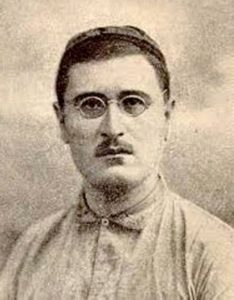Cholpon
 Abdulhamid Cholpon – one of the greatest figures of contemporary Uzbek literature, the author, whose works have touched many hearts and whose influence on Uzbek literature is still felt in modern times.
Abdulhamid Cholpon – one of the greatest figures of contemporary Uzbek literature, the author, whose works have touched many hearts and whose influence on Uzbek literature is still felt in modern times.
As the founder of modern Uzbek poetry, author of the novel “Night and Day”, which is considered one of the masterpieces of modern Uzbek literature, and a brilliant journalist whose newspaper editorials covered the most topical issues of those turbulent times, Cholpon made an invaluable contribution to the development of Uzbek intellectual thought.
His emotionally intense novel “Night and Day” is considered his most representative work and is greatly admired for the powerful portrayal of the characters and social malaises of those times.
His literary prowess reached its peak in the mid-1920s to mid-1930s – the era traditionally referred to as the golden age of modern Uzbek literature. This was the period which saw a flowering of the literary talent of some of the best minds of our nation, such as Abdulla Qodiriy, Abdurauf Fitrat, Usmon Nosir and many other representatives of Uzbek creative thought, most of whom were subsequently executed during Joseph Stalin’s Great Purges.
Abdulhamid Cholpon was born in 1893 in Andijan in the family of an affluent merchant. He showed prodigious literary ability in his formative years, and closely followed the most influential regional newspapers and periodicals of the time, which played a key role in shaping his political and social views. He later worked on the editorial board of a number of local Uzbek newspapers. Cholpon translated works by many prominent Russian authors, such as Aleksandr Pushkin, Anton Chekhov, Nikolay Gogol and Maksim Gorkiy, into Uzbek. He was also the first person to translate William Shakespeare’s “Hamlet” into the Uzbek language.
Cholpon was one of the first Uzbek playwrights and spent several years in Moscow in the mid-1920s in a drama studio designed to train the first Uzbek actors.
In his works Cholpon promoted the ideas of human freedom, equality, justice and independence, and for many years was the target of an intense and relentless smear campaign by Soviet press propaganda for his liberal views.
Cholpon was arrested in 1937, during the peak period of Stalin’s Great Purges, on charges of treason and being “an enemy of the people”. He was executed on 5 October 1938.
